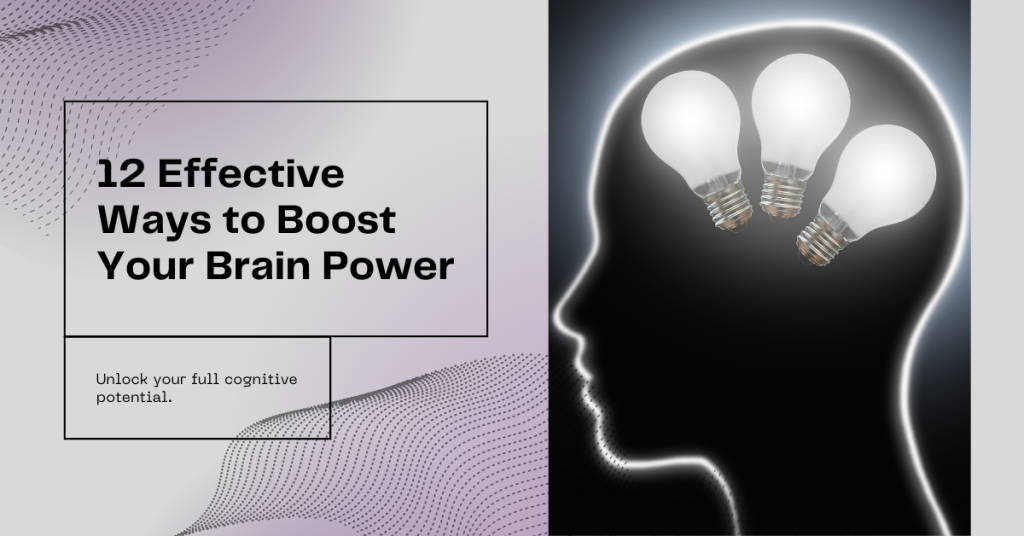Introduction:
Enhancing brain power is a goal many aspire to achieve, whether for academic, professional, or personal reasons. Brain power encompasses various cognitive functions, including memory, focus, creativity, and problem-solving abilities. In today’s fast-paced world, where mental agility is highly valued, improve brain power has become increasingly important. This article explores twelve effective ways to enhance brain power and optimise cognitive function.
Nutrition to Improve Brain Power:
Nutrition plays a crucial role in brain health and cognitive function. Consuming a balanced diet rich in nutrients such as omega-3 fatty acids, antioxidants, vitamins, and minerals is essential for optimal brain performance. Foods like fatty fish, nuts, seeds, berries, leafy greens, and whole grains have been shown to boost brain power and protect against cognitive decline.
Physical Exercise and Brain Health:
Regular physical exercise is not only beneficial for physical health but also for brain health. Engaging in aerobic exercises like walking, jogging, swimming, or cycling increases blood flow to the brain, promotes the growth of new neurons, and enhances cognitive function. Additionally, strength training exercises improve mood, memory, and overall brain health.
Mental Stimulation:
Keeping the brain active and engaged is vital for maintaining cognitive function and preventing cognitive decline. Mental exercises such as reading, solving puzzles, learning a new language, or playing musical instruments stimulate neural connections, improve memory, and enhance problem-solving skills.
Adequate Sleep:
Quality sleep is essential for cognitive function and overall brain health. During sleep, the brain consolidates memories, processes information, and clears out toxins. Chronic sleep deprivation can impair cognitive function, attention, and decision-making abilities. Therefore, ensuring adequate and restful sleep is crucial for optimizing brain power.
Stress Management to improve brain power:
Chronic stress negatively impacts brain function and can lead to memory problems, decreased focus, and cognitive decline. Implementing stress management techniques such as deep breathing, meditation, yoga, or spending time in nature helps reduce stress levels, improve mood, and enhance cognitive performance.
Mindfulness and Meditation:
Practicing mindfulness and meditation has been shown to positively impact brain structure and function. Mindfulness techniques cultivate present-moment awareness, reduce mind-wandering, and enhance attention and concentration. Regular meditation practice strengthens neural pathways associated with cognitive flexibility and emotional regulation.
Socialization:
Maintaining social connections and engaging in meaningful relationships is beneficial for brain health. Social interactions stimulate cognitive function, promote emotional well-being, and reduce the risk of cognitive decline. Joining clubs, volunteering, or participating in group activities fosters social engagement and supports overall brain health.
Continuous Learning:
Lifelong learning promotes brain plasticity and enhances cognitive reserve, protecting against age-related cognitive decline. Engaging in new experiences, acquiring new skills, and challenging oneself intellectually stimulate brain activity, improve memory retention, and foster cognitive flexibility.
Brain-Boosting Supplements:
Certain supplements have been touted for their potential to enhance brain function and cognition. However, it’s essential to approach supplements with caution and consult with a healthcare professional before taking them. Omega-3 fatty acids, vitamin B12, ginkgo biloba, and curcumin are among the supplements that may support brain health when used appropriately.
Brain Games and Puzzles:
Playing brain games and solving puzzles can be fun and effective ways to exercise the brain and improve cognitive function. Activities like crossword puzzles, sudoku, chess, or brain-training apps challenge the mind, enhance problem-solving skills, and promote mental agility.
Balanced Lifestyle:
Maintaining a balanced lifestyle that encompasses physical activity, healthy eating, adequate sleep, stress management, and socialization is essential for optimal brain health. Adopting a holistic approach to well-being supports overall cognitive function, enhances brain power, and fosters a fulfilling and meaningful life.
Conclusion:
Improving brain power is achievable through various lifestyle modifications and habits that promote brain health and cognitive function. By incorporating these twelve strategies into daily life, individuals can enhance their mental agility, memory, focus, and overall cognitive performance, leading to a sharper mind and a healthier brain.
FAQs:
Can brain power be improved at any age?
Absolutely! The brain has remarkable plasticity, allowing it to adapt and change throughout life. Regardless of age, adopting healthy habits and engaging in activities that stimulate the brain can enhance cognitive function.
Are there any side effects of brain-boosting supplements?
While some supplements may offer benefits for brain health, they can also have side effects or interact with medications. It’s essential to consult with a healthcare professional before taking any supplements to ensure safety and efficacy.
How much exercise is needed to boost brain power?
The recommended amount of exercise for brain health is at least 150 minutes of moderate-intensity aerobic activity per week, along with strength training exercises two or more days per week. However, even small amounts of physical activity can provide cognitive benefits.
What role does hydration play in brain function?
Staying hydrated is crucial for optimal brain function, as even mild dehydration can impair cognitive performance. Drinking an adequate amount of water throughout the day supports concentration, memory, and overall brain health.
Can brain games prevent cognitive decline?
While brain games and puzzles can improve cognitive function and mental agility, they may not necessarily prevent cognitive decline on their own. However, incorporating a variety of brain-stimulating activities into daily life can contribute to brain health and potentially reduce the risk of cognitive decline.













[…] has a profound impact on the brain, triggering complex neurological processes that affect various cognitive functions. Studies have shown that listening to music stimulates the release of neurotransmitters such as […]